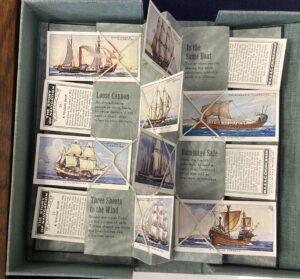 Strolling through the Second Floor of Boatwright Library the other day, I spotted some works on display from our Rare-Books collection. Since I have an unfathomable interest in nautical words, I turned a weather eye toward that case of treasures.
Strolling through the Second Floor of Boatwright Library the other day, I spotted some works on display from our Rare-Books collection. Since I have an unfathomable interest in nautical words, I turned a weather eye toward that case of treasures.
It must the the lore of sea faring that hooks me. I’m decidedly not a “water person,” my biggest adventures in a boat involves paddling a 12′ kayak in the salt marshes of Virginia’s Eastern Shore. When I see the line of breakers meaning the bay or ocean, I pivot back and head for home. So I’m an armchair swab, I suppose. Since “swab,” being the verb for mopping up a deck, can also mean “sailor,” we have our first October metaphor.
The image snapped by me comes from Jessica Spring’s book Fathoming, printed in a special 2015 edition with a set of tobacco cards (itself an old-timey collectible). The cards pictured feature three metaphors clearly from sailing or ships: “three sheets to the wind,” “loose cannon,” and “in the same boat.” I will leave it up to the reader to recall times they or someone they know embodied any of those phrases.
Yet “Rummage Sale” proved new to me. The description reads “from the French arrumage, to load a cargo ship. Damaged cargo was sold as arrumage, or rummage.” We don’t say “rummage sale” too often these days, with land lubbers’ “flea markets,” or in the UK, motorists’ “boot sales” taking their place.
Other nautical metaphors can be found all around us. Think of how frequently “anchor” works as an active verb or strategically employed noun.
Some have become bit dated, like “steamer trunk”: I suspect that few of us travel with them, today. Half a century ago, however, college students often toted one to the dorm. There it then served as a bench (if sturdy enough), a table, or an extra closet to hold extra linens, maybe a secret bottle to let said student and friends get three sheets to the wind.
When bad weather looms, I say “batten down the hatches,” though I did not know what a “batten” was until I restored some 150 year-old board-and-batten doors from a farmhouse. Battens are the nailed-down cross boards that hold the door together. If someone says “pipe down,” they are metaphorically sounding a bosun’s whistle, while you probably learned the ropes without ever climbing a ship’s rigging. And I do tell employees that for some events, we need all hands on deck.
You can amuse yourself for a long time looking over the nautical terms that NOAA describes in a blog post. You may even find some of these terms slipping into harbor in academic prose. Meanwhile, don’t fall into the doldrums before the next post. Let NOAA’s post and Captain Google tide you over. I’ll weigh anchor now, so until next time, fair winds and smooth sailing.
Send in useful words or metaphors, by e-mailing me (jessid -at- richmond -dot- edu) or leaving a comment below.
See all of our Metaphors of the Month here and Words of the Week here.



